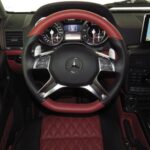Janis Joplin, the queen of psychedelic soul, stepped up to the microphone at Sunset Sound recording studio on October 1, 1970. With her band, Full Tilt Boogie, ready but unneeded, she announced with a mischievous glint, “I’d like to do a song of great social and political import.” Then, unleashing her iconic, whiskey-soaked voice, she launched into the unforgettable opening line: “Oh Lord, won’t you buy me a Mercedes-Benz? / My friends all drive Porsches, I must make amends…” These Janis Joplin Mercedes Benz Lyrics, seemingly simple, belied a deeper message that resonated with a generation questioning consumerism and the pursuit of material happiness.
The Genesis of “Mercedes Benz”: From Poem Fragment to Anthem
“Mercedes Benz” wasn’t a meticulously crafted studio creation. Its origins were far more spontaneous, born from a playful moment in New York City. While on tour, Joplin found herself in a pool hall with friends Rip Torn and Emmett Grogan. The trio started singing a somewhat distorted version of a poem by Michael McClure. The line that stuck, the lyrical seed that would blossom into Joplin’s signature song, was “Oh Lord, won’t you buy me a Mercedes-Benz?”
Intrigued by the fragment, Joplin, back in California, collaborated with friend and songwriter Bob Neuwirth to expand upon McClure’s initial idea. They fleshed out the verses, adding desires for a color TV and a “night on the town,” each request dripping with irony. Joplin then contacted Michael McClure in San Francisco to get his blessing. Upon hearing Joplin’s rendition over the phone, McClure famously quipped that he preferred his own version, even singing it to her accompanied by his autoharp. Joplin, with her characteristic cackle, retorted that she too preferred hers, and an amicable agreement was struck for both versions to exist. This anecdote highlights the organic and collaborative nature of the song’s development, moving from a fragmented poetic line to a fully formed satirical commentary.
Recording “Mercedes Benz”: A Spontaneous Studio Moment
By late summer 1970, Janis Joplin was deeply invested in her new album. After achieving fame with Big Brother and the Holding Company, her solo career was at a crucial juncture. She entrusted the production to Paul Rothchild, renowned for his work with The Doors. Rothchild insisted on recording at Sunset Sound, a departure from the usual CBS studio policy, which CBS president Clive Davis reluctantly approved.
The sessions at Sunset Sound were productive, yielding powerful tracks like Joplin’s own “Move Over” and Kris Kristofferson’s “Me and Bobby McGee.” On that Thursday, October 1st, the album was nearing completion. “Mercedes Benz” was almost an afterthought, a spontaneous addition. The recording itself was remarkably simple: Joplin’s unaccompanied voice, raw and emotive, capturing the song in a single take. Later that same day, she also recorded a playful, cocktail-lounge style version of “Happy Trails” as a birthday gift for John Lennon, showcasing the lighthearted atmosphere of the sessions.
Rothchild later recalled the period as being filled with “fun,” a stark contrast to the personal struggles Joplin was privately facing. Despite a period of sobriety, she had relapsed into heroin use, explaining it as a way to curb her alcohol consumption during the demanding recording process. This detail adds a layer of poignancy to the seemingly carefree recording of “Mercedes Benz,” hinting at the complexities beneath the surface.
The Enduring Message of the Lyrics: Satire and Self-Awareness
The power of “Mercedes Benz” lies in its deceptively simple janis joplin mercedes benz lyrics. The song is a sharp satire of consumerism, a critique of the societal obsession with material possessions as a path to happiness. Joplin, who described herself as a “middle-class white chick” from Texas, had witnessed firsthand the allure of consumerist ideals. Coming to California in the early 60s, she became a leading voice in a counter-culture movement that rejected such values, embracing utopian ideals of anti-materialism.
When Joplin sang about wanting a Mercedes-Benz, a color TV, and a night on the town, it was with a knowing wink. She understood the hollowness of these desires, the fleeting nature of material satisfaction. As she once said, “It’s the want of something that gives you the blues. It’s not what isn’t, it’s what you wish was that makes unhappiness.” The song encapsulates this sentiment perfectly, using humor and irony to expose the emptiness of chasing worldly goods for fulfillment.
Ironically, outside the Landmark Motor Hotel on the night of her tragic death from a heroin overdose on October 4th, 1970, sat Joplin’s own Porsche. She had purchased the car in 1968 and famously had it painted in psychedelic colors. The woman who sang “My friends all drive Porsches” was, in reality, someone who appreciated the tangible pleasures of life, including the thrill of driving a Porsche. This detail underscores the nuanced perspective of the song; it’s not a complete rejection of enjoyment, but rather a commentary on the misplaced emphasis on material wealth as a source of lasting happiness. The janis joplin mercedes benz lyrics are therefore not a simple condemnation, but a witty and self-aware reflection on societal values and personal desires.
Conclusion: A Timeless Anthem
“Mercedes Benz,” born from a spontaneous jam session and finalized in a single studio take, became one of Janis Joplin’s most recognizable and enduring songs. Its simple yet profound janis joplin mercedes benz lyrics continue to resonate today, serving as a timeless anthem against the pitfalls of consumerism and the ever-elusive search for happiness in material possessions. The song stands as a testament to Joplin’s artistry, her ability to blend humor, social commentary, and raw emotion into a powerful and unforgettable musical statement. It’s a reminder that true fulfillment lies not in the acquisition of things, but in something far deeper and more meaningful.
